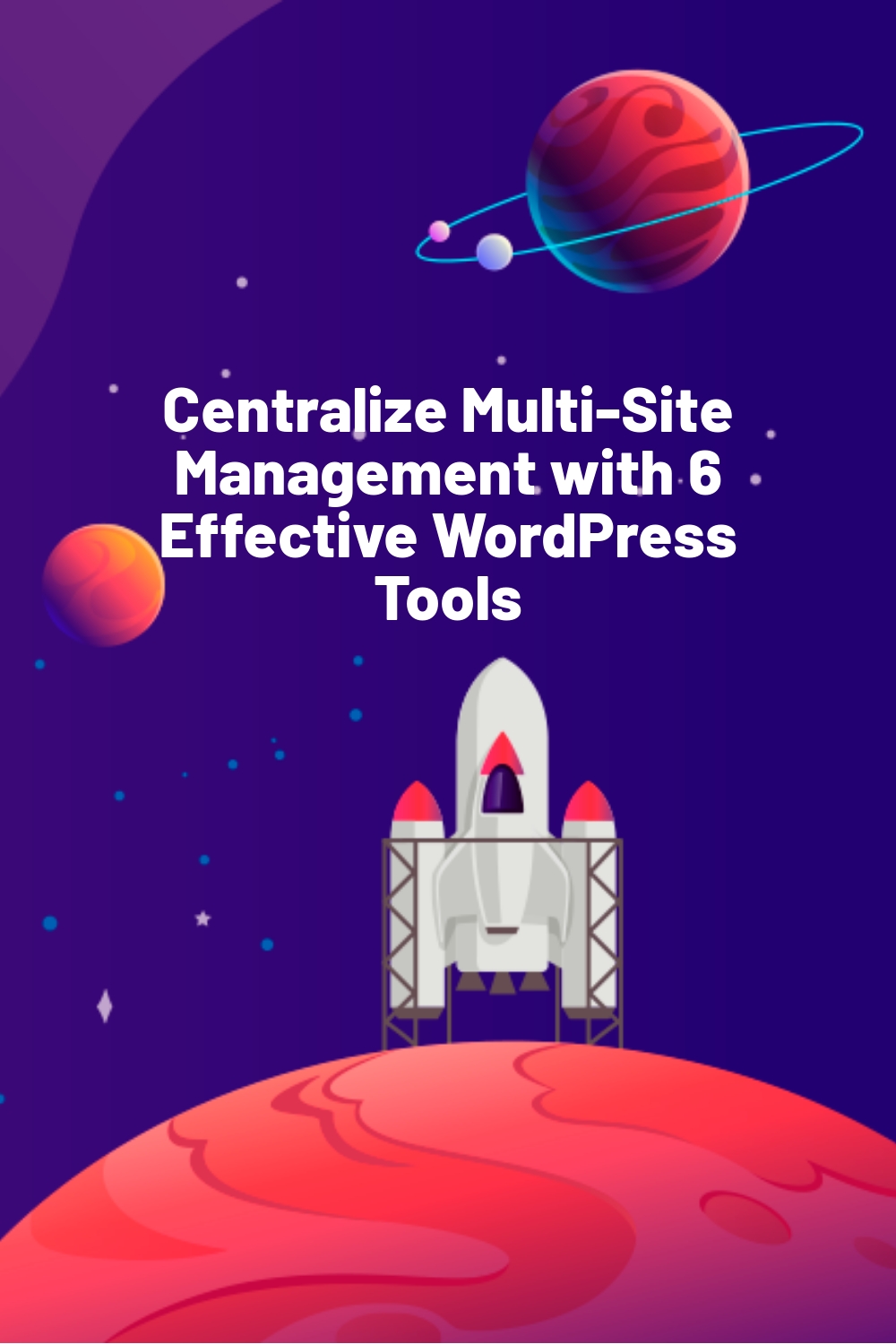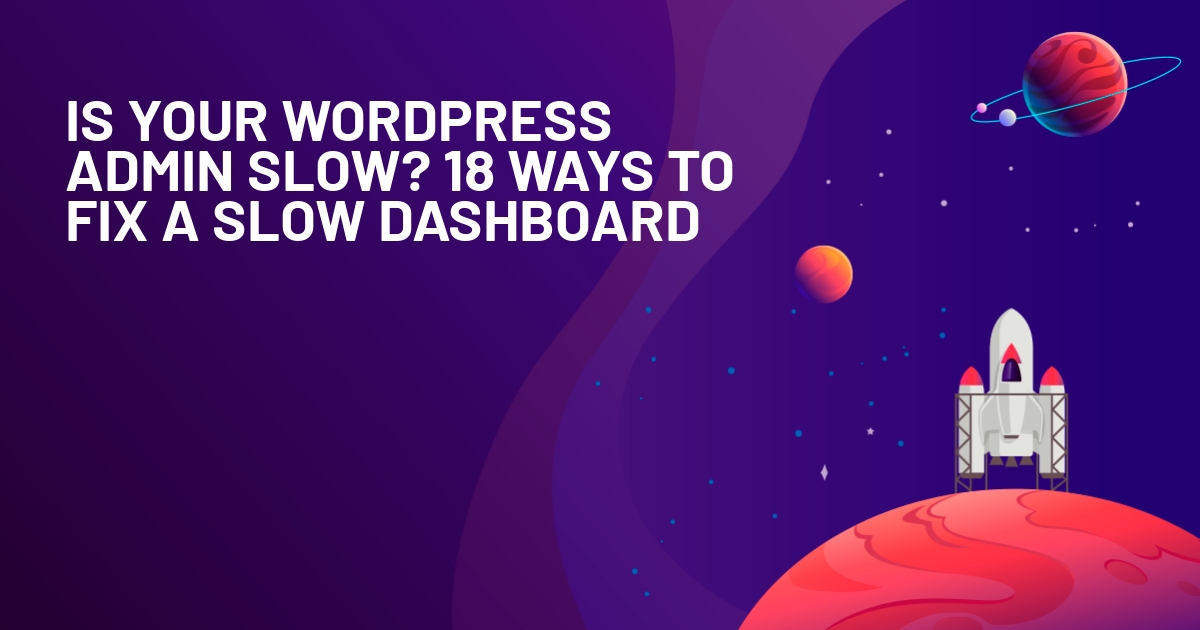WPLift is supported by its audience. When you purchase through links on our site, we may earn an affiliate commission.
Centralize Multi-Site Management with 6 Effective WordPress Tools
If you run more than one website – or plan to do so in the future – then keep reading as in this article, I will be looking at how to manage multiple WordPress sites.
To begin with, I will explain why you should use a WordPress management tool to help you and the essential features to look for in such a tool. Finally, I will be suggesting some useful solutions to help get you started.
So, without further ado, let’s jump straight in.
Why You Should Use a Management Tool on Multiple WordPress Sites
If you only have one WordPress site, keeping a grip on things like maintenance, updates, security, backups/restores, and even admin passwords is pretty straightforward.
However, imagine how difficult things become when you have several sites on the go. In fact, the more you have, the bigger the headaches get. And things get even more challenging when managing sites for multiple clients. This is where WordPress management tools can help.
What Are WordPress Management Tools?
Generally speaking, these WordPress management tools allow you to handle several WordPress sites from a single unified dashboard. From that one dashboard, you can quickly and easily:
- Access the backend of each site
- See at a glance if the core, theme, and plugins are all up to date
- Run security scans
- Do backups
- Keep track of all other routine maintenance tasks.
Using such tools to manage multiple WordPress websites will not only save you considerable time, but they also help keep the sites fully updated and in tip-top condition.
Essential Features To Look For in WordPress Management Tools
Luckily, several ready-made solutions are available containing the tools you need to manage multiple WordPress sites. However, to be of any use to you, these solutions should have the following features as a minimum:
- The Ability to log in directly to any of your websites with a single click from one central location
- Perform bulk WordPress core updates
- Implement bulk theme and plugin updates
- Carry out automatic and manual backups and restores
Of course, there are plenty of other ‘nice to have’ features too. Therefore, if you choose a solution with some or all the following additional features, your life in the WordPress world will become much more straightforward:
- Security monitoring
- Uptime monitoring
- Performance and SEO audits and optimization
- Analytical data gathering and reporting
- Management of the domain and web hosting
- User management
- Comment management
Please note the ‘nice to haves’ list is not exhaustive, and features will vary considerably from one solution to the next.

Article Continues Below
An alternative method to manage multiple websites is to use the multisite feature of WordPress. However, that uses an entirely different approach that I will leave for a future article.
Suggested Tools To Help Manage Multiple WordPress Sites
Here are six of the most popular solutions currently available that provide the necessary tools to help you manage multiple WordPress sites from a single dashboard:
ManageWP

Kicking off this list is the hugely popular ManageWP.
This freemium solution from GoDaddy (although you don’t need to use their hosting services to use it) includes everything you need to manage all your WordPress sites from one centralized cloud dashboard. However, even in its free version, ManageWP helps you handle maintenance, monitoring, security, and more on your websites.
I particularly like the modular structure of ManageWP. On the one hand, with the free core service, you can pick and choose the features you need the most from an extensive list of freebies. And on the other, you can also select the premium features you need, and you pay a minimal charge per site per month for those – no more paying for things you will never use.
Key Features of the Free Version
- Single-click login
- Theme and plugin management with single-click updates
- Performance and security checks
- Vulnerability updates
- Monthly cloud backups
- Google Analytics and client reports
- Comment management
- Maintenance mode
- Team collaboration
Typical Premium Add-ons Include
- Enhanced backup features
- White-label reports (no ManageWP branding)
- SEO ranking
- Uptime monitoring
- Advanced reporting
- Advanced security features
- Link monitoring
- Site cloning and migration
Pricing
- The core plugin of ManageWP is free, and there is an extensive range of free add-ons to tailor it to your needs. Each premium add-on costs just $1 per month per website, except the backups add-on, which is $2. Reduced-price bundles are also available for agencies managing more than twenty-five sites.
Infinite WP

InfiniteWP is another freemium solution for managing multiple WordPress sites. In its free form, it does not boast as many features as the free version of ManageWP, although it is enough to get you started.
Unlike ManageWP, where the management dashboard is cloud-hosted, InfiniteWP is self-hosted, which is better if you are picky about privacy. This means you first install the admin dashboard (either using the installation plugin or uploading the files using FTP). Then, you install the InfiniteWP Client plugin to each WordPress site you need to manage.
Key Features of the Free Version
- Single-click login
- Single-click updates
- Manual backups and restores
Key Features of the Premium Versions
- Enhanced backup and restore features, including time capsule
- Automatic/scheduled backups
- Extensive security features, including malware scans, two-factor authentication, etc.
- Uptime monitor
- Site installation, migration, and staging
- Various Google tools, including Analytics, Pagespeed, and Webmaster crawl reports
- Client reports
- User and comment management
- Content management (edit posts, pages, and links)
- Checker for broken links
- Bulk file uploads
- Integrations with WordPress security plugins
- Site cloning and migration
Pricing
- The core version of InfiniteWP is free, although limited on features. On the other hand, the Premium versions are fully features and start from $149 per year for ten sites, rising to $647 for unlimited domains. Furthermore, the Premium versions come with a 14-day moneyback guarantee.
MainWP

Like InfiniteWP, MainWP is a self-hosted solution for managing multiple WordPress sites from a single dashboard. However, the free version of MainWP includes considerably more features, making it a good starting point for those who crave all the bells and whistles. Furthermore, a wide range of free and premium extensions are available to enhance functionality, or you can opt for the Pro version, which bundles all extensions.
MainWP recommends creating a blank WordPress installation to host the MainWP Dashboard plugin. That will provide the focal point from where you manage all your ‘child’ sites. The MainWP Child plugin must then be installed on every site to be administered from the dashboard. Incidentally, both plugins are available for download from the developer’s website or through the WordPress plugin directory.
Key Features of the FreeMainWP Version
- Single-click access
- Single-click and automated updates
- Theme and plugin management, including abandoned alerts
- Multiple backup solutions
- Content management and bulk posting
- Uptime monitoring
- Dashboard customizer
- Vulnerability checker and security scans
- WooCommerce shortcuts
Typical Premium Extensions
- Bulk setting manager
- Article uploader
- Comments manager
- Yoast SEO management
- Enhanced security, monitoring and backup/restore features (including time capsule)
- Enhanced monitoring
- Analytics (Google, Lighthouse, Piwik, etc.)
- Staging (for testing changes to sites before setting them live)
Pricing
- The core MainWP plugin is free, and several free extensions are also available. Prices of the premium extensions range from $39 to $69 each per year.
- Alternatively, you can purchase the MainWP Pro plan which includes all current and future extensions for $29 per month or $249 per year. A lifetime plan is also available for a one-time fee of $399. Furthermore, purchases come with a 30-day moneyback guarantee.
iThemes Sync

Sadly, iThemes Sync no longer offers a free version of their multiple WordPress site management tool.
However, all is not lost, as its pricing is competitive and the solution is feature-rich, making it an excellent option for centralized management of multiple WordPress sites. Therefore, expect to find all the necessary maintenance, backup, monitoring, security, and management tools you are ever likely to need.
Key Features
- Single-click access
- WordPress core, theme, and plugin management, including one-click updates, email notifications, and changelogs
- Uptime monitoring with email notifications should any of your sites malfunction
- SEO checker tool
- Google Analytics and Google Search Console integration
- BackupBuddy integration for remote backups
- Security management via iThemes Security integration
- Yoast SEO integration
- Customizable client dashboard
- User and comment management
- Client care features, including monthly maintenance reports
Pricing
- Five different iThemes Sync plans are available. The cheapest option is the 5 Site Plan, which costs $6.99 if you pay monthly, or $69 if you pay for the entire year upfront. Conversely, the most expensive plan is the 100 Site Plan costing $69.99 monthly or $699 annually. Prices for more than 100 sites are available on request.
No moneyback guarantee is given, but you can try the 5 Site Plan free for thirty days.
CMS Commander

Unlike all other solutions I have listed so far, CMS Commander is premium only, with no free version available. That said, it is competitively priced compared to the paid versions of the freemium options I have listed. Furthermore, a 30-day free trial is available, too, so you can test it out before committing to your hard-earned dollars.
CMA Commander is a third-party rather than self-hosted platform, meaning site management is all cloud-based.
Of course, being a premium-only plugin, the features list of CMA Commander is extensive. As such, it includes everything needed to manage all your websites from one central point, including tools for bulk posting and content spinning across multiple sites. Furthermore, plentiful monitoring and analytics features help you keep a firm grip on what is happening.
Key Features
- Single-click access
- Single-click updates
- Bulk plugin installation and activation
- Copy blog settings (including plugin settings) between sites
- User account and comment management
- Content management, including bulk posting and editing, auto-scheduling, article rewriting and spinning, etc.
- Advanced backup and restore options, including multiple backup destinations, website cloning, etc.
- Google Analytics and backlink tracking
- Uptime and page speed monitoring
- Security features, including secure SSL and malware scanning
- Maintenance mode
- One-click database optimization
Pricing
- The pricing of CMS Commander is based on the number of sites and users (admins, not visitors.) The cheapest scenario is five websites with no users, which costs $8 per month. Meanwhile, thirty sites with three users cost $20 per month. Finally, if you have 200 domains and twenty users, you will be paying $75 per month.
- No moneyback guarantee is available, but as already mentioned, you can try CMS Commander free for thirty days.
WP Remote

I’m ending this list with WP Remote, which is a freemium option. Even with the free version, you can track and perform updates to the WordPress core, plugins, and themes on an unlimited number of sites.
Unfortunately, the free version does not handle backups, monitoring, analytics, or security though – you will need to buy a premium plan or use other plugins for those.
Furthermore, several (paid) add-ons are also available to add more functionality to any plan, for example, more frequent backups, visual regression testing, or additional staging sites.
Key Features of the Free Version
- Single-click login
- Track and update WordPress core, themes, and plugins
- Install and activate themes and plugins
- Two-factor authentication
Key Features of the Premium Versions
- Automatic daily backups (every six hours on the most expensive plan)
- Active staging sites (two on lower-priced plans, five on the costliest)
- Regression up to 365 days of backups (depending on the plan purchased)
- Uptime monitoring and performance checks
- Slack integration
- Team management
- Google Analytics
- Client reports (white label)
- Security features such as malware scans, firewall, bot protection, etc. (excluding the cheapest plan)
Pricing
- Other than the free version, the plans of WP Remote are available: Basic, Plus, and Pro. Of course, features vary between each, and pricing depends on the number of websites to be covered.
- By way of example, the cheapest combination is Basic for five sites which costs $29 per month or $299 per year. The next plan, Plus, costs $49 and $499 respectively for the same number of sites, while the most expensive option, Pro, will cost $99 per month or $999 per year.
- Should you need to cover 100 domains, Basic will cost $99 per month or $999 per year. However, that rises to a whopping $999 per month or $9,999 per year for the Pro plan.It should be noted that all paid plans come with a 30-day moneyback guarantee.
What’s Your Favorite Tool For Managing Multiple WordPress Sites?
I’m certain you are now wondering which of the six solutions I suggested you should choose to manage your multiple WordPress sites.
Of course, the answer to that really depends on each individual case. For example, if you are massively concerned about privacy, a self-hosted solution would be the best option. In that scenario, either InfiniteWP or MainWP would be worth a look.
However, if you are comfortable with a cloud-based hosted solution, ManageWP stands out to me as the logical option as it bundles a fantastic range of features for free, and even the premium ones are budget-friendly. Just don’t dismiss the others as you may find they match your requirements better.
Are you already using one of my suggested solutions to manage multiple websites? If so, what have your experiences been with it so far? And have you tried any others? Please do let me know in the comments section below.










Thanks for the great reviews. Some detail correction..
I use InfiniteWP on dozens of sites.
Additional cool (paid) features include:
– malware scan multiple sites with sucuri
– manage users on multiple sites
– bulk comment moderation on multiple sites.
Another option not mentioned here is CMS Commander.
I didn’t know there were that many. About a year ago, I made the tradeoff myself between ManageWP and InfiniteWP. I chose for InfiniteWP because of the price tag and the self hosted solution. What I like the most right now, a year later, is the slick interface and the active development of InfiniteWP. New addons are being built all the time. Uptime monitoring, cloning, installing developer themes from github… You name it and they’re building it.
Sick Network is also something to keep a close look at.
I’ve got ManageWP’s free service currently since it allows me to easily upgrade the plugins and themes that I have, which is primarily the reason I used the services.
Just one note, the backup option is not available for a free account. You need the Standard plan as a minimum to use this.
Hi Ajay,
Thanks for pointing that out. I have corrected my mistake and updated the article.
Thanks,
Joe
I’ve been using ManageWP for about a year now and it’s made dealing with almost 20 WordPress sites more bearable. I highly recommend it.
Thanks for the informative post, as I add more websites they are starting to get really unwieldy. Not sure where to start, maybe ManageWP it seems popular in the comments.
This is a great list, I can recommend checking out Paul’s product iControlWP. I just interviewed him and he really has a unique perspective on pricing and the software itself.
Plus, he’s a downright nice guy!
Thanks Matt, appreciate the kudos! :)
Joe,
Huge thanks for including our iControlWP service in this round-up, I appreciate it.
I’d like to just add, if I may, to the conclusion of “Best Premium Service”. You mentioned about cost/pricing flexibility – one of our unique approaches is the ability to pick-and-choose and pay-as-you-go with all our additional features.
We’ve priced the entry level cost per-site tiny, so you have full flexibility to add and use extra services as and when you need them, or they become available. There’s no lock-in and no prohibitive pricing tiers. We even remove unused licenses from your account when you don’t use/need them! :)
I hope you don’t mind me adding to this… I thought our unique approach got missed in the final conclusion and wanted to share a bit more on the details.
As to whether it remains to be seen if we can stand next to the rest and succeed, we’re already there and doing it :D
Thanks again for including us and helping us get the word out! Much appreciated.
Cheers,
Paul.
Paul,
Thanks for adding that extra information about your product.
Glad to hear iControlWP is doing well and has lots of happy users.
Cheers,
Joe
Hello,
great review, I’m about to decide wich solution I will dive into. Maybe Worpit is missing to your comparison!
After trying several of these, I went with InfiniteWP and a couple of their plug-in bundles. A great value and time saver for me.
Just a note; InfiniteWP isn’t quite pay once and done. You have to pay yearly for continued support and updates to the addons.
Yea, InfiniteWP’s pay yearly gets really expensive for small website owners who run only a handful of WP sites =(
So far very satisfy using Infinite WP. Free or Premium addons works very well.
Really nice write up. Just a little bit ago I started out with WPRemote until I realized there was no help with restoring, just a zip of the site + DB downloaded to my computer. Not too bad for a free service, but with ManageWP I pay very little and have access to automated backups and what looks like a one click restore. ManageWP has also made moving WordPress sites to a new host easy as pie…I’m now a huge fan.
Is there a way to test InfiniteWP’s premium features before I can buy it? I need the ability to Publish posts from a central location with different users. I think InfiniteWP offers those options, but I want to test them before buying.
Also i can’t understand MainWP’s prices. Are those monthly, annually or all-time prices?
Hi,
I’ve been using ManageWP for a while now and I am quite happy with it except for one feature which is the Backup to remote server feature.
And my problems started when I added a site which had a large backup file size( around 300MB) then the backup kept failing and I tried to contact their support and they asked for more server resources which wasn’t easy to fix in this case and I still face problems with sites that are having a PHP memory limit of less than 256MB.
I wonder if anybody else has similar problems with ManageWP or any of the other services in this aspect?
Thanks.
Thanks for this review. iRemoteWp is new face of managing multiple WordPress sites.Free for 5 WP sites without limit. I think you should try it.
Useful information thanks. I have used WP Remote but often found that the info varies from what is on my Dashboard.
I might have missed this, but are you or anyone aware of a site where you can view the stats of all of your websites (WP) on one page?
Seems to me this would be a great time saving instead of having logged into each.
I have changed to MainWP. They are really good. Support is quick (solving my problem in 1 day – creating a beta child plugin in advance) and the prices are low.
I came from Infinite WP. They forgot my problem/bug and didn’t give me response 14 days!!! I had to open a new ticket to give me feedback again. They services don’t work (backup – main feature) for me but don’t give me support. I paid for something but never got it.
‘Of course’ they won’t refund my money becaus nobody else report bugs… pathetic…
I tried MainWP but it was hopeless – always crashing and the backup feature just wouldn’t work on any of my sites. What a shame because it looks great, but just doesn’t work.
I switched to infiniteWP and so far I have to be honest and say it’s been fantastic. I wish the pricing was a bit more in line with MainWP – however – it works and at the time of writing they have a 50% off promotion fro 4th July.
I have many sites but I have not been managed my sites
then I have use CMS Commander it is a very best WordPress plugin
Thank you for sharing this article